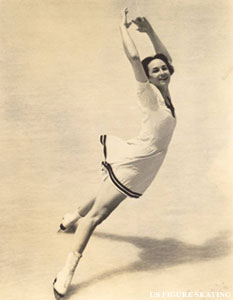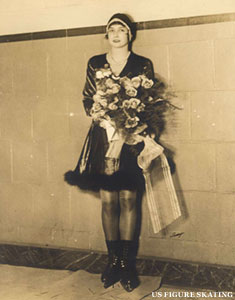
It wouldn’t be completely accurate to call Maribel Vinson-Owen the Bob Knight of figure skating. But it wouldn’t be entirely inaccurate either. After all, she was a successful coach with a fiery disposition, and she did famously throw a chair at one of her students. This was more than 50 years ago. The student was Ron Ludington, who became the bronze medalist in the pair event at the 1960 Olympics. He went on to coach many skaters to the Olympics himself.
Owen also trained Frank Carroll, who in this analogy would be Mike Krzyzewski. He coached Michelle Kwan and 2010 gold medalist Evan Lysacek. Speaking of Owen, Carroll has admitted on numerous occasions, “I was scared to death of her.”
Owen demanded respect and got it. When most in the profession were men, Owen guided many athletes to the top of the sport -- most notably 1956 Olympic champion Tenley Albright, who went on to become a surgeon. Owen also coached her own daughters, Laurence, 16, who competed in the 1960 Olympics and was the U.S. national champion in single skating in 1961, and also Maribel, 20, the U.S. national champion in pair skating that same year.

As a skater, Owen won an unprecedented and still unmatched 15 gold medals -- nine in single and six in pair -- at the national championships between 1926 and 1937. She was a three-time Olympian and won the bronze medal for the United States in 1932.
Owen was a remarkable figure outside the rink as well. She was a graduate of Radcliffe, class of 1933. She was the first female sportswriter for The New York Times and wrote three books on the sport. She is described by those who knew her as being “ahead of her time,” and as someone who fought for equality. Not only did she want her skaters to be great, she also wanted them to be educated and was known to quiz them on SAT words while driving them from one rink to another. Widowed early in life, she was a single parent. By coaching and writing, she supported her daughters and also her mother in Winchester, Mass.
Owen was killed at the age of 50 in a plane crash that also took the lives of the entire 1961 U.S. figure skating team that was headed to the world championships in Prague. There were 18 athletes --including Owen's daughters -- six coaches, judges and several family members on board.
To commemorate the 50th anniversary of this tragedy, US Figure Skating commissioned a film called RISE, which played in 500 theaters across the country on Feb. 17. Due to popular demand, it will be shown again March 7. RISE chronicles the lives of several of the victims of the crash and their influence on the sport.
On screen, Maribel Vinson-Owen emerges as a colorful and complex character. In archival footage, she can be seen coaching Laurence while wearing bright red pants and a cap with a feather in it. During a practice session, she skates right alongside her daughter with intensity, guiding her into place on the ice.
Owen was quite a hands-on coach. It was not uncommon for her to slap a skater’s leg or hips with a plastic skate guard to correct a body position. She would even grab a little girl by the ponytail to get her attention. Of course, this was during an era when this brand of disciplining was more acceptable. Back then, wooden paddles were kept in school classrooms.

So Owen’s students feared her. But they also admired her. Owen could be playful, with a laugh that could be heard from across the rink. She was also dedicated to all of her students. She cared about them and they knew it. In RISE, her former students speak of her with fondness and a solemn reverence.
Ludington says she threw the chair at him because he cursed at her under his breath. They fought it out and the next night, they continued as if nothing had happened. “She didn’t hold grudges,” he says. “I was rough around the edges. If she hadn’t been that way with me, I wouldn’t be who I am today.” Ludington still keeps a photo of Owen in his office. The inscription Owen wrote to him in one of her books reads, “It was fun, most of the time, wasn’t it?”
And Carroll credits much of his coaching success to Owen. He has been thinking about her a lot since Lysacek won the Olympic gold. In RISE, he says, as if speaking to her, "Maribel, if I could only call you and thank you for all you have done for me and helping me to be able to do this for this young man."
After the crash in 1961, the sport of skating in America embarked on the long process of rebuilding. Skaters who had retired were asked to come back to compete, and elite coaches from Europe were invited to come and fill the holes that were left by Owen and her colleagues. A memorial fund was set up to financially assist other skaters in achieving their dreams. This next group of skaters and coaches felt they were continuing what the victims of the crash had started.
By dedicating her life to her students and driving from rink to rink in the Boston area at all hours of the morning and night, Owen impressed them with her passion for the sport. She motivated them and drew out their best. In so doing, she inspired many of her skaters to become not just champions, but, like Ludington and Carroll, to become coaches as well.
Though their coaching methodologies and ways of disciplining aren’t quite like hers, Ludington and Carroll are known to be some of the hardest-working coaches in the business. Many of their students have also gone on to coach subsequent generations, and, in turn, many of those skaters are now entering the coaching profession. In fact, most people in the skating world today are connected to Maribel Vinson-Owen. She is the matriarch of her sport, and in some ways she always will be.
Vinson-Owen and her daughters are buried in Mt. Auburn Cemetery in Cambridge, Mass. Today and every day, Harvard students will walk past her grave on the way to class. Few will know her legend. But anyone who watches a minute of figure skating will appreciate her impact.




